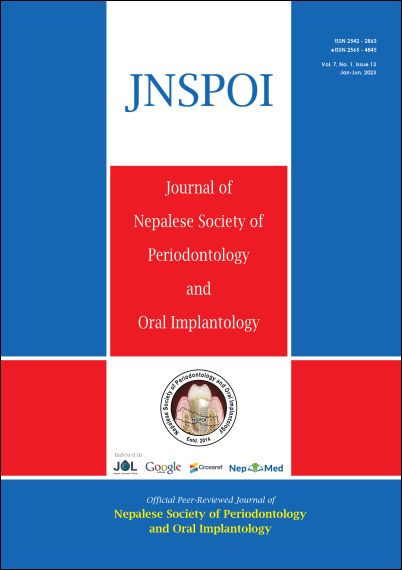Association between Subjective Happiness and Periodontal Disease in Patients Visiting at a Tertiary Care Centre of Central Nepal
DOI:
https://doi.org/10.3126/jnspoi.v7i1.60881Keywords:
Chronic periodontitis, oral health, subjective happiness scale, wellbeingAbstract
Introduction: Happiness has been considered as a colloquial term for subjective well-being. There is a causal relationships and factors contributing to happiness achievement and satisfaction. One of the major factors is oral health in which periodontitis plays a major role.
Objective: To explore the association between subjective happiness and periodontal disease.
Methods: A descriptive cross-sectional study was conducted in the Department of Periodontology and Oral Implantology from August 2018 to June 2019 after obtaining ethical clearance from the institutional review committee (IRC). Where 103 patients with chronic periodontitis according to the 1999 classification system were recruited by convenient sampling methods and were asked to fill out the questionnaire of subjective happiness scale given by Lyubomirsky. This scale was compared on the basis of periodontitis severity. Data were collected and entered into Microsoft Excel and statistical analysis was done using SPSS v.20. Data were represented as mean and standard deviations and the association between happiness and periodontitis was determined using Chi-square test.
Results: Out of 103 patients the mean subjective happiness score was found to be 18.78±1.692. Similarly, there was no significant association between happiness scale and periodontitis in the present study (P value = 0.821).
Conclusions: There is evidence of the relationship between subjective happiness and periodontitis. The findings of this study revealed a new perspective on periodontitis, including the potential for innovative treatments of a specific population with periodontitis.
Downloads
Downloads
Published
How to Cite
Issue
Section
License
Copyright (c) 2023 Nepalese Society of Periodontology and Oral implantology (NSPOI)

This work is licensed under a Creative Commons Attribution 4.0 International License.
© Nepalese Society of Periodontology and Oral implantology (NSPOI)
Licenced by Creative Commons Attribution 4.0 International License.




